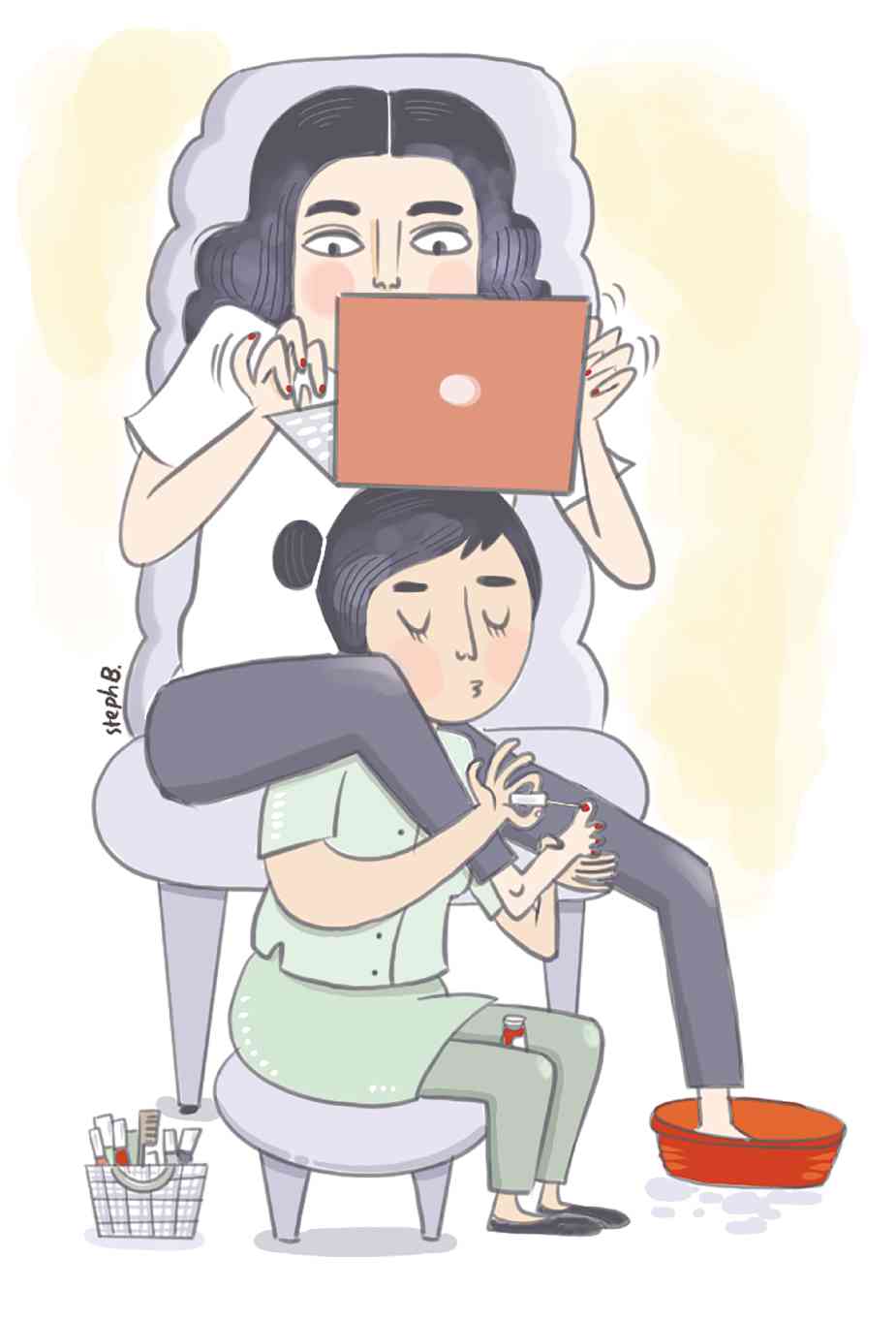The future of work?
 CEBU CITY—Editorial assistant Grace Zabala-Oberes was waiting for her two children outside their school in Talisay City, southern Cebu when her phone rang.
CEBU CITY—Editorial assistant Grace Zabala-Oberes was waiting for her two children outside their school in Talisay City, southern Cebu when her phone rang.
She was asked to email a set of photos to the central news desk.
Oberes took out her laptop, sent the photos and called up daydesk based in Makati City to check if the photos had been received.
Welcome to the virtual newsroom, where online communications take the place of face-to-face interaction in a brick-and-mortar office, and where connectivity in the digital age stretches out indulgently.
Since it closed its physical office in November 2018 amid the paradigm shift to an increasingly digital and online environment, the Inquirer Visayas bureau based in Cebu has been operating a virtual newsroom, jump-starting what could be a burgeoning trend among businesses stymied by absenteeisms caused by the metro’s traffic chokehold.
Here’s how it works: The three Cebu-based bureau staff members, assistant bureau chief Ador Mayol, Oberes and myself work on remote—either in the confines of our homes, inside coffee shops or anywhere with a strong internet connection and cellular phone signal.
Unlike in the 1990s, when the Visayas bureau first established a physical office, we no longer have to put up with an internet that could be accessed only through a modem—that small box that acted like a bridge between the local network and the internet that depended on landlines.
Fax machines
Since not everyone then had access to an internet connection, stories were sent to the bureau mainly through fax machines (also attached to a landline), which were then typed to the computer before these were edited and sent to the Makati central news desk.
Communication was also heavily dependent on landlines since cellular phones were not only very expensive but also didn’t have a wide coverage.
Now, there is internet connection anywhere. Correspondents can also be reached anytime since everyone has cellular phones with access to the internet.
Correspondents file their stories wherever they can write. And editors edit them anywhere as long as there’s a laptop and an internet connection.
Fortunately, for most of Inquirer’s correspondents based in other provinces, the transition to virtual office was relatively painless.
Iloilo-based Inquirer reporter Nestor Burgos Jr., for one, rarely goes to the bureau office in the 18 years that he has been writing for the paper.
He drops by during bureau meetings and training sessions since most communications and interactions have been done online or by phone.
Still, Burgos believes that the shift to a virtual newsroom has strengthened communication and coordination with the bureau staff.
“A virtual newsroom encourages the full use of online resources and platforms, including group chats, messaging and online collaborative apps for faster and more efficient communication and coordination,” he said.
Work-life balance
It also provides a better work-life balance among Cebu-based bureau staff.
For Oberes, it means being able to bring her two children to and from school and attend to their needs while still doing her job as editorial assistant.
Mayol meanwhile manages to attend to his 74-year-old mother while on the job.
“She used to have no one to talk to when I’m away from home. Now we eat together and spend more time with each other,” he said.
Having a virtual newsroom also means avoiding traffic and starting work early.
I usually give instruction to correspondents as early as 5 a.m. through private messages while preparing to bring my son to school. I also check the Inquirer broadsheet through its online edition.
While driving my son to school, I listen to the radio newscast and call either the correspondents, Mayol or Oberes, using a Bluetooth headset.
I start processing stories on my laptop while waiting for my son to be released from school. In between, I surf the internet to check if there are story ideas worth pursuing.
Work sometimes ends at the wee hours of the morning after I finish processing breaking stories sent by correspondents covering a calamity or President Duterte’s late night visits in the provinces.
The staff also gets to hold meetings and conferences without cost, although fixing a day and time when we are all available for a video conference can be tricky.
Paperless office
Going virtual is also good for the environment since we don’t have to use paper to file our stories, nor fill out documents or forms since these can be done online.
All that means lower operating costs since the company no longer has to pay for office rental, cable subscription, landlines and electricity.
Since shifting to a virtual newsroom, the bureau’s output for breaking stories has increased.
Despite its apparent advantages, running a virtual newsroom has its downside.
Having no fixed office hours also means being on call all the time, whether we are on our day off, on leave, or about to sleep.
You also need to learn how to troubleshoot when you’re having problems with your laptop since we no longer have a handy IT (information technology) personnel around to fix the problem. True, Manila-based IT personnel can issue instructions over the phone, but not all of us are adept at tinkering with computers.
Mayol’s problem with working in a virtual newsroom soon became apparent—in his waistline. With less exercise now that he works home most of the time, he has started gaining weight.
“Obviously, the amount of food I eat at home also doesn’t help keep my body in shape,” he said.
Distraction
Working at home can also be boring since there are no colleagues to talk to, or interact with, or simply horse around with.
One’s children can also be a distraction and can make you miss deadlines.
My 6-year-old son for instance has developed the habit of pulling me from my laptop and asking me to play with him during crunch time.
Since internet connection in the Philippines is only slightly better than in Bangladesh, the sudden disappearance of internet connection while sending a story can cause panic and a heart attack.
Sometimes, there is a lag especially in communicating online.
There was a time when I sent instructions to Oberes through private message. After several minutes, I noticed that the message had not been read. I decided to call her. It turned out she had fallen asleep.
Still, the benefits of working at home cannot be outweighed by its disadvantages.
There is no price tag on having a work-life balance. Working in an office makes you miss out on your children’s milestones or simple family gatherings.
But under this setup, we have the best of both worlds—being with our families while doing the job that we love so much.




















